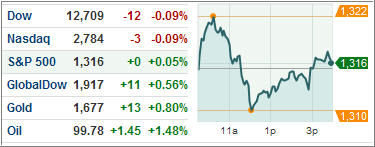As we wait for a resolution between Greece and its bondholders, markets stood flat as the S&P 500 chimed in a meager 0.05%. Meanwhile, the 10-year Treasury climbed to a yield of 2.07%, indicating that investors are less risk averse than they have been in recent weeks.
For the first time in over two weeks, the Euro has broken above the $1.30/Euro level. However, a negative outcome in Greece can quickly send the Euro back down.
As crunch time approaches in Greece, European leaders and the IMF among others are putting pressure on bondholders to accept a haircut. Lest we forget, even a 50% haircut would only reduce Greece’s debt-to-GDP to 120%, which is still unsustainable. A restructuring deal will only delay the likely inevitable default.
Greece’s decision to arrest big time tax evaders, whose foregone taxes could’ve covered the nearly $20 billion debt payment due in March, is unfortunately too little too late. The damage has been done and Greece’s credibility has been laid to waste.
To ramp up aid efforts, Germany has now suggested that it combine the long-term European Stability Mechanism (ESM) bailout fund with the temporary EFSF. This would boost the overall financial firepower given that the EFSF by itself has been largely ineffective. The combined funds would create a rescue fund with over $1 trillion in ammunition.
In Germany, 1-year bonds sold for just above 0%, highlighting fears among investors who’d rather park their money away to earn virtually nothing than to put it into riskier assets. This is surely an indication of how worried investors are about the debt crisis.
MIT economist and former IMF chief economist Simon Johnson has stated that the Eurozone is heading for an ugly ending. In his view, Eurozone members have simply borrowed far too much and lack the finances to pay off their debt, further exacerbated by a common Euro that makes devaluation very costly if a Eurozone country went off the Euro.
While we haven’t talked about it much, it will be interesting to see how the oil picture plays out in the wake of mounting tension between the U.S. and Iran. Already, the EU’s oil import ban resulted in a price increase with oil hovering near $100. In the grander scheme of things, commodities continue to be volatile.
It’s hard to tell where markets will head until we see some finality on Greek restructuring talks. But the signs aren’t very encouraging at the moment, keeping us invested in a low risk portfolio.
Contact Ulli

Comments 1
The info in the ETF Bully and stat-sheets is appreciated and helpful. I invest in mutual and bond funds primarily. This information is up to date,concise, and i feel like a good analysis and projection of the market. I follow several market advisory letters on the internet and by mail. I do believe the info and projections provided by Ulli rate high.